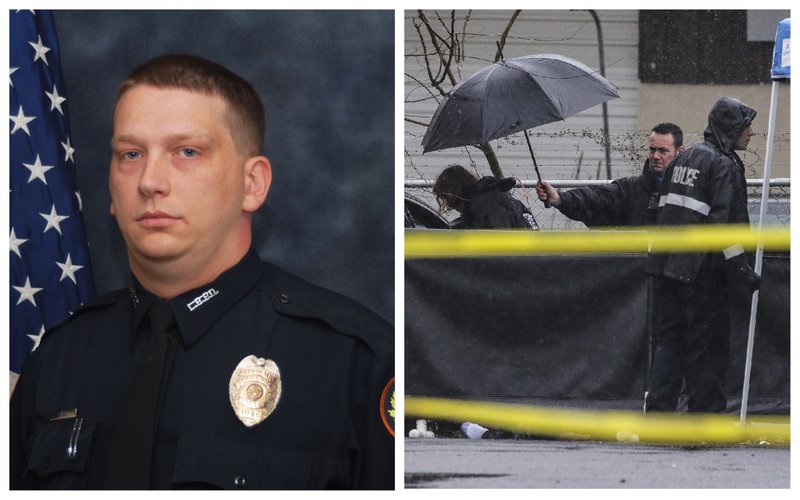Little Rock interim Police Chief Wayne Bewley said Thursday that the removal of a policeman's gun and badge after an officer-involved shooting is an "indicator that it's something of concern."
In the days after officer Charles Starks shot and killed Little Rock resident Bradley Blackshire, the officer's status with the department changed from being on administrative leave to being relieved of administrative duty.
Starks, 31, was conducting a traffic stop on a stolen vehicle near West 12th Street and South Rodney Parham Road on Feb. 22 when he fatally shot Blackshire, according to previous releases.
A police report said Blackshire, the 30-year-old driver of the vehicle, refused to comply with the officer's command during the traffic stop and pulled forward, causing the stolen 2018 Nissan Altima to strike Starks.
Starks fired his department-issued weapon, fatally hitting Blackshire, according to previous releases. Starks was transported to a hospital to receive treatment for his injuries.
An officer placed on administrative leave may still work in some capacity at the Police Department, but an officer who is relieved of duty may not. An officer put on either designation is paid for the duration of the investigation into whether the officer's actions violated department policies or laws.
Bewley said Thursday evening that while the designation denotes some cause for concern regarding the officer's actions, "it is not an indicator of what that concern is."
Officers are not relieved of duty often, but five of the past six officers who Little Rock police administration relieved of duty had been arrested or were arrested shortly after.
Only six officers' suspensions have been made public since 2009, although many more have been placed on administrative leave.
Three were arrested in fistfights or brawls and were relieved of duty shortly thereafter. Two were the subject of an internal investigation and arrested within two months of their badge and gun being removed.
One man was relieved of duty after a random drug test showed he had an unacceptable blood-alcohol level while on duty.
None were relieved of duty during the course of an officer-involved shooting investigation, although there have been seven officer-involved shootings in since 2014, according to department records. Department policy dictates that an officer is placed on administrative leave for the duration of the investigation.
Dashboard camera footage of the shooting has not been released. In a video statement released Friday afternoon, Bewley said the video may be released as early as the end of next week.
"I know that there is a great deal of interest and demand from the community to release the dash-cam video," Bewley said in the video. "At this point, we anticipate that we will have the criminal investigation completed by the end of next week. At that time, we will submit the file to the prosecuting attorney's office and at that point, we will release the video evidence to the public."
A review of disciplinary records shows Starks was suspended for 25 consecutive days in 2016 as a result of two internal investigations. Details about the investigations are heavily redacted, but one was the result of a 2015 case and the second a 2016 incident.
Starks has acquired 10 reprimands on his disciplinary record since becoming an officer in August 2013, including two vehicle accidents, two internal investigations, one citizen complaint and five divisional issues.
Bewley said in the video that all officer-involved deadly force investigations are two-pronged. There is a criminal investigation completed by the major crimes division, and an administrative investigation conducted by the professional standards office.
The criminal investigation, when completed, is submitted to the prosecuting attorney's office. That office will determine whether there are any criminal violations.
The complete administrative investigation file is forwarded through the chain of command to the chief of police, with each supervisor giving his or her opinion on the matter and recommending discipline when necessary. The chief of police makes the final decision on the officer's conduct.
Although investigations are worked on simultaneously, Bewley pointed out the investigations are separate.
"It's my promise as the interim chief of police to conduct a thorough and transparent investigation into this incident," Bewley said.
"I'm also asking members of the Little Rock Police Department to also be patient and allow due process to continue. I do recognize the job of a law enforcement officer is very difficult. I also know that we are a very professional organization, and I ask that we remain focused and professional and carry out our mission to serve the citizens of Little Rock."
A Section on 03/02/2019
